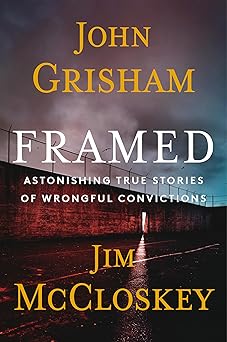
John Grisham, known worldwide for his bestselling novels, has a real-life passion for justice that led to his work with Jim McCloskey of Centurion Ministries, the first organization dedicated to exonerating innocent people who have been wrongly convicted. Together, they offer an inside look at the many injustices in our criminal justice system. A fundamental principle of our legal system is a presumption of innocence, but once someone has been found guilty, there is very little room to prove doubt. These ten true stories shed light on Americans who were innocent but found guilty and forced to sacrifice friends, families, and decades of their lives to prison while the guilty parties remained free.
Each of the stories is told with astonishing power and reveals the recurring factors involved in so many unrighteous convictions. John Grisham and Jim McCloskey recount the dramatic hard-fought battles for exoneration, taking a close look at the racism, misconduct, flawed testimony, and corruption in the court system that can make wrongful convictions so hard to reverse. These stories are not just about the victims, but also about the families, friends, and loved ones who were torn apart by the system's failures. What makes Framed important reading is not the shock value, but the exposure of the infuriating and recurrent factors that lead to so many unrighteous convictions. The authors expertly weave together the complexities of the justice system, making the stories both gripping and thought-provoking.
Framed is a book that will leave you feeling disturbed, but also inspired to make a difference. It's a call to action, urging readers to pay closer attention to the justice system and its vulnerabilities. The book has been praised for its impeccably researched and suspenseful storytelling, and it's clear that Grisham and McCloskey have poured their hearts and souls into this project. The result is a book that will resonate with anyone who cares about justice, mercy, and the protection of human rights.
I just finished reading this book and I have to say, it's left me with a lot to think about. The author and Jim McCloskey have shared some incredible true stories of people who were wrongly convicted and imprisoned, often for decades. What's most striking about these stories is how often they involve systemic failures and injustices, such as racism, misconduct, and corruption. These factors can combine to create a perfect storm of error, leading to wrongful convictions that seem impossible to reverse.
As I read through the book, I couldn't help but think about my own life and relationships. I had a friend who was wrongly accused and convicted of a crime they didn't commit, and I can only imagine how difficult and heart-wrenching that experience must have been for them and their loved ones. The book is not just about the victims, but also about the families and friends who were torn apart by the system's failures. It's a powerful and emotional read that will make you feel disturbed, but also inspired to make a difference. The authors have woven together these stories with such sensitivity and care, making it easy to become fully immersed in each chapter.
One of the most important takeaways from this book is the need to pay closer attention to the justice system and its vulnerabilities. As readers, we often assume that our justice system is fair and just, but the truth is that it can be flawed and prone to error. This book is a call to action, urging us to be more informed and engaged in our communities and to demand justice and mercy whenever possible. The writing is impeccable, and the stories are both gripping and thought-provoking. I left the book feeling grateful that I had read it, and eager to share its important message with others.
Rating: 4.0 / 5.0
Framed is a powerful and emotional read that sheds light on Americans who were innocent but found guilty, forcing them to sacrifice their lives to prison while the guilty remained free. The book, written by John Grisham and Jim McCloskey, recounts ten true stories with astonishing power, revealing recurring factors involved in wrongful convictions such as racism, misconduct, flawed testimony, and corruption in the court system. The stories not only highlight the victims but also the families and friends who were torn apart by the system's failures, leaving readers feeling disturbed but inspired to make a difference.